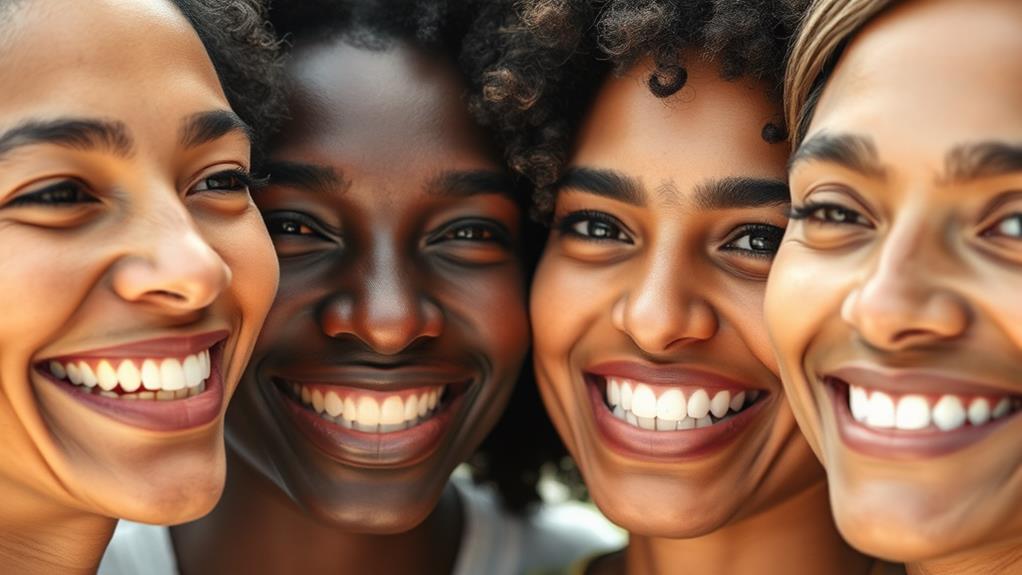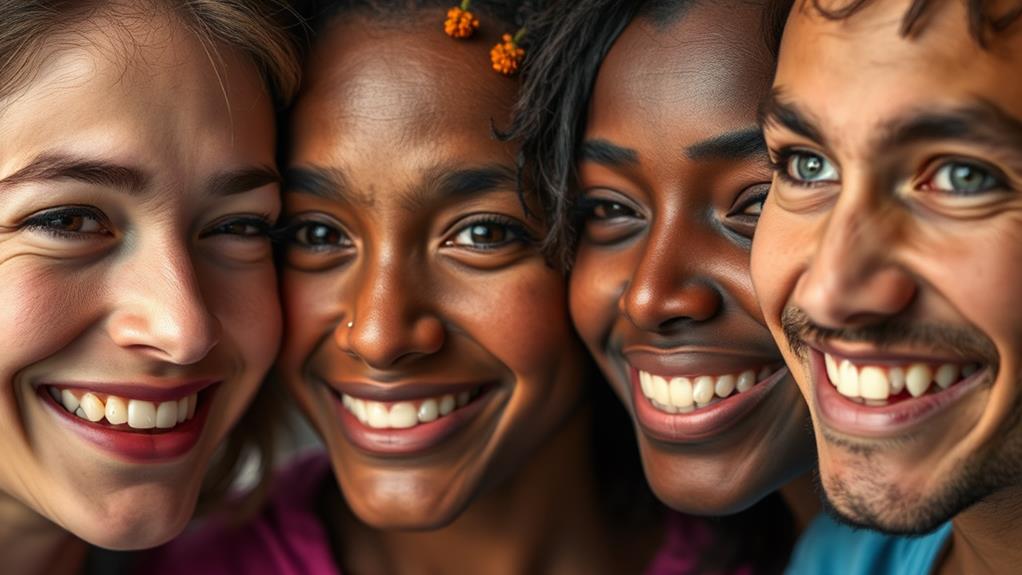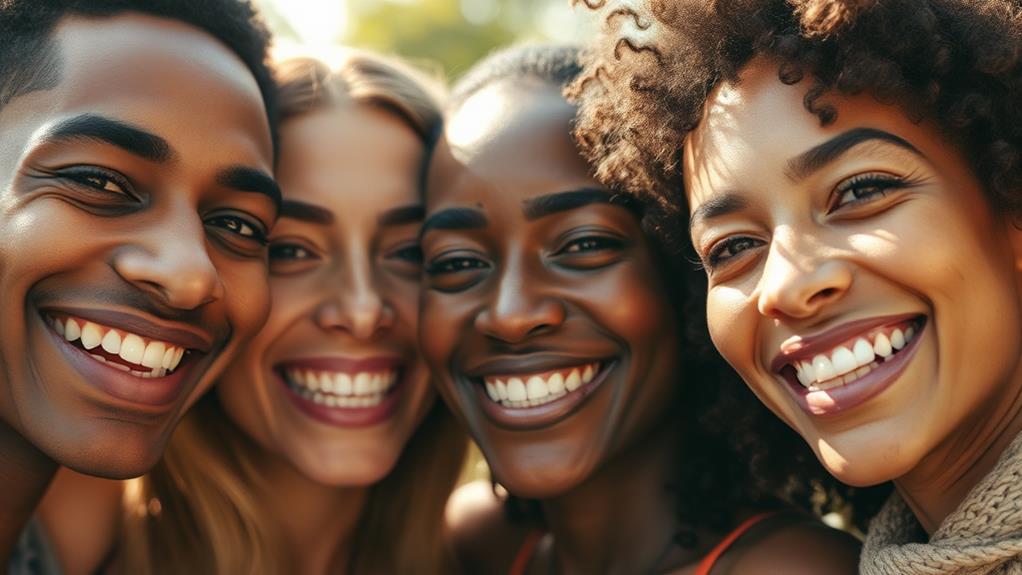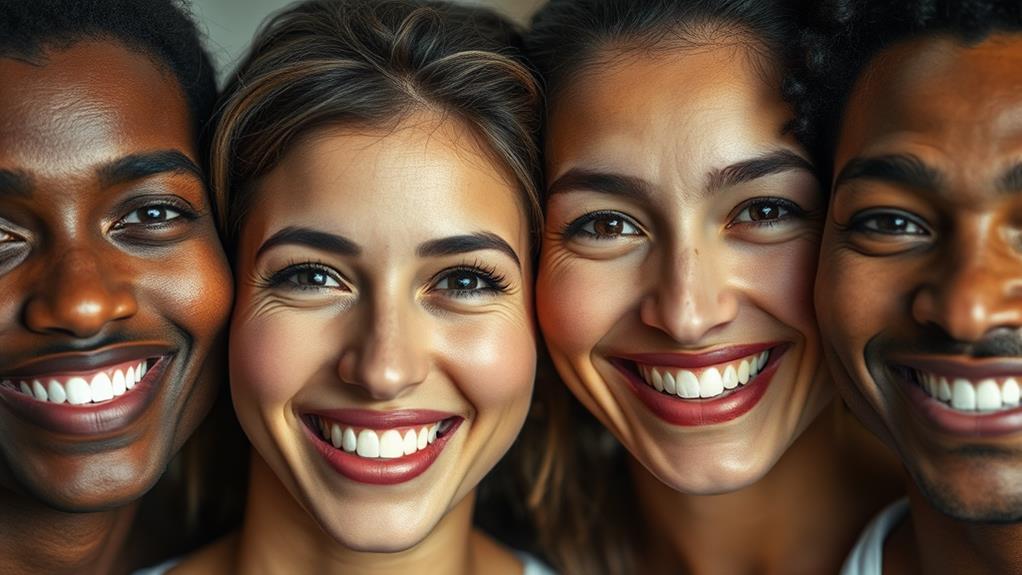When you smile, it doesn't just light up your face; it communicates a wealth of information about your emotions and personality. Whether it's a genuine grin or a polite smirk, each type of smile carries its own message, influencing how others perceive you. As you consider your own smile, think about the feelings and signals it conveys to those around you. What hidden meanings lie beneath that simple expression? Understanding this could change the way you approach social interactions and even impact your confidence.
Key Takeaways
- A genuine smile indicates real happiness and warmth, enhancing approachability and fostering connections with others.
- Different types of smiles convey various emotions, from politeness to nervousness, influencing social interactions without words.
- Confident smiles attract others and project self-assurance, creating a positive atmosphere in social situations.
- Cultural variations in smiles can affect interpretations, as not all smiles signify the same emotions or intentions across different cultures.
- Smiling has health benefits, boosting mood, reducing stress, and contributing to overall well-being and longevity.
The Science of Smiling

When you smile, your brain releases neurotransmitters like dopamine and serotonin, which can instantly boost your mood. It's like your brain's little party trick! These chemicals make you feel happier and more relaxed. Plus, smiling is contagious. When you flash a grin, others can't help but smile back. It's a win-win!
Now, let's dive deeper into why smiling is so powerful. When you smile, you're not just sending good vibes to yourself; you're also telling those around you that you're friendly and approachable. This can help you make new friends and strengthen existing relationships.
Ever notice how a smile can brighten someone's day? It's true!
Interestingly, smiling can even trick your brain. If you're feeling down, forcing a smile can help lift your spirits. Your brain thinks, "Hey, I must be happy!" This little trick can change your day from gloomy to sunny in no time. So, next time you're feeling blue, try smiling!
In the grand scheme of things, your smile is like a superpower. It spreads joy, connects you with others, and can change the atmosphere around you. Keep smiling—it's good for you!
Types of Smiles
There are several types of smiles, each conveying different emotions and intentions. You might be surprised to learn that a smile can say a lot without using any words!
For instance, the genuine smile, often called the Duchenne smile, involves not just your mouth but also your eyes. When you smile like this, it shows real happiness and warmth.
Then there's the polite smile. You know, the one you flash when you meet someone new? It's friendly but doesn't always mean you're feeling super excited. It's more like a social lubricant, helping to keep things smooth and easy.
Don't forget the nervous smile! This one often pops up when you're feeling awkward or unsure. You might smile in an effort to lighten the mood, even if you're really just trying to survive a cringe-worthy moment.
Smiles and Emotions

Smiles can reveal a lot about what you're feeling inside, often serving as a window into your emotional state. When you smile, it can show happiness, excitement, or even nervousness. Think about it—when you see a friend, your smile lights up, and that joy is contagious!
But not all smiles mean the same thing. A quick grin might mean you're trying to be polite, while a big, toothy smile could show that you're genuinely thrilled. Sometimes, people smile even when they're feeling sad or anxious, trying to hide their true emotions. It's like putting on a mask!
You might notice that when you're feeling down, even a small smile can lift your spirits. It's a little trick our brains play. The more you smile, the happier you often feel.
Plus, smiling can make others feel good, too!
Confidence and Your Smile
A confident smile not only enhances your appearance but also communicates self-assurance to those around you. When you smile with confidence, you're sending a message that says, "I'm happy to be here!" It's like wearing a superhero cape, but without the spandex—much more comfortable, right?
Your smile can change how you feel about yourself, too. When you flash a bright grin, your brain releases happy chemicals, which can make you feel more positive. Have you ever noticed that when you smile, even if you're not feeling great, it can lift your spirits? It's true!
Plus, people are naturally drawn to those who smile confidently. You might find that when you smile, others are more likely to smile back, creating a friendly vibe. Think of it as a contagious happiness!
Smiles in Social Interactions

When you enter a room and share a smile, it can instantly change the atmosphere. Smiling is like a magic wand that makes people feel warmer and more welcome. When you smile, others are likely to smile back, creating a friendly vibe.
It's amazing how a simple expression can break the ice and make conversations easier. In social interactions, your smile shows that you're approachable. Imagine walking into a party, feeling nervous. A smile from someone can make you feel at ease and ready to chat.
Smiling can also show that you're listening and interested in what others are saying. It's a great way to express kindness without saying a word. Sometimes, you mightn't even realize how your smile impacts those around you.
A smile can lift someone's mood, brighten their day, or even encourage them to join in on a conversation. Just think about it: when you smile, you spread happiness like confetti!
Cultural Variations in Smiling
Cultural nuances shape how people express their emotions, and smiling plays a significant role in this. Did you know that not all smiles mean the same thing everywhere? In some cultures, a big, bright smile is a sign of friendliness and openness. You might flash a grin when you meet someone new, and they'll feel welcomed.
However, in other places, a smile can be more reserved. It might even be seen as a sign of politeness rather than excitement. For example, in Japan, people often smile to hide their true feelings. So, if you're in a crowd, don't be surprised if someone smiles while feeling shy or nervous!
Meanwhile, in many Western cultures, a smile usually shows happiness or confidence. Isn't that interesting?
Even the context matters! In some cultures, it's common to smile during serious situations, while in others, it could be considered inappropriate.
The Impact of Smiling

Smiling has a remarkable impact on both the person smiling and those around them. When you smile, it's like sending out a tiny ray of sunshine. It brightens your mood and makes you feel happier. Plus, people can't help but smile back at you! It's true; smiles are contagious. You mightn't even realize it, but when you flash a grin, you could be lifting someone else's spirits, too.
Think about it—when you see someone smiling, doesn't it make you feel good? Smiling creates a friendly atmosphere and helps break the ice. You might be in a room full of strangers, but a simple smile can make everyone feel a little more connected.
Not to mention, smiling can make you seem more approachable. If you're at school or work, people are more likely to want to talk to you if you've got a smile on your face. It's like a secret code that says, "I'm friendly!"
Smiling for Health Benefits
A genuine smile can do wonders for your health. When you flash those pearly whites, your body releases feel-good chemicals called endorphins. These little buddies help lower stress and boost your mood. So, next time you're feeling down, try smiling—it's like magic!
But that's not all! Smiling can even strengthen your immune system. Think of it as giving your body a little pep talk. When you smile, it signals to your brain that everything's okay, which helps you fight off those pesky germs.
Plus, smiling makes you look more approachable and friendly. You might find that people are drawn to you, making social situations easier and more enjoyable. Who wouldn't want to be the person everyone wants to chat with?
And here's a fun fact: smiling can actually make you live longer! Research suggests that happier folks tend to have longer lives. So, go ahead and flash that smile—it's not just for show, it's a health boost too!
Enhancing Your Smile

When it comes to enhancing your smile, there are plenty of options that can really amp it up. First off, consider teeth whitening. Whether you choose strips, gels, or a professional treatment, a brighter smile can make a big difference. You'll feel like you just stepped out of a toothpaste commercial!
Next, don't forget about your dental hygiene. Brushing and flossing regularly can keep your teeth healthy and shining. Plus, visiting your dentist for check-ups is super important. They can spot any issues before they become big problems.
If you're looking for something more, think about cosmetic dentistry. Procedures like veneers or bonding can fix chips and gaps, giving you that perfect look. It's like giving your teeth a makeover!
Lastly, remember that confidence is key. Practice smiling more often in the mirror. You might find that the more you smile, the more it feels natural.

